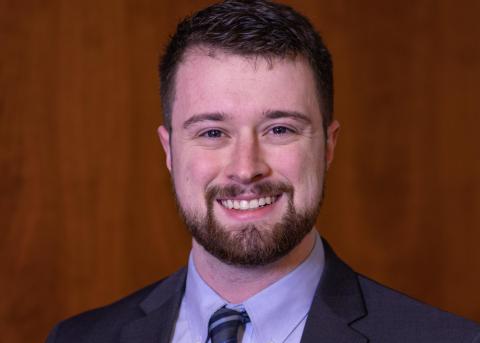What a legal education should be
Our groundbreaking curriculum and experiential learning opportunities allow you to personalize your legal education. Here, you will shape your own experiences and graduate with practice-ready skills.
Our juris doctor program is rooted in practice-oriented instruction, featuring courses taught by renowned faculty – many of whom have extensive practice experience – as well as live-client clinics and a far-reaching legal residency (externship) program that provide substantive real-world, hands-on experience. Qualified students can also take part in the Daniel Webster Scholar program, the first and only-in-the-nation competency-based bar-alternative program. DWS students hone their skills in both simulated and real settings (counseling clients, working with practicing lawyers, taking depositions, appearing before judges, and mediating), while creating portfolios of written and oral work for bar examiners to assess every semester. Successful DWS scholars are sworn into the New Hampshire Bar the day before graduation, allowing them to practice immediately upon graduation.
JD students can choose from a robust selection of courses and opt for a curricular track focused on:
- Business Law
- Criminal Law
- Intellectual Property: Patent Law
- Intellectual Property: Trademarks and Copyright
- Sports and Entertainment Law
- Litigation
- Public Interest and Social Justice
Offerings also include dual degrees in partnership with UNH, including JD/MBA, JD/MSW, and JD/MPP, as well as several joint degrees, including JD/LLM in Intellectual Property, and JD/LLM in Commerce and Technology.
In addition, our curriculum allows JD or joint degree candidates to specialize further by earning a JD certificate in a specific area of study:
- JD or dual degree candidates with an interest in sports and entertainment can pursue a JD certificate in sports law, entertainment law or sports and entertainment law from the Sports and Entertainment Law Institute.
- JD and joint degree candidates specializing in intellectual property may opt for a Franklin Pierce Intellectual Property Law JD certificate.
- Students interested in shaping innovative health care policies and research may earn a JD certificate of health law and policy.

From Biology to Law, JD Student Carves Path For Patent Career
Meet Matthew Middleton
UNH Franklin Pierce School of Law rose into the Top 5 for intellectual property in the 2020 US News & World Report rankings. The law school joins Stanford Law School, NYU Law, and UC Berkeley Law in the top-tier for IP legal studies. It's not only the school's renowned faculty, but the school's...
Concentrations
Courses include:
- Antitrust Law
- Bankruptcy
- Business Associations I
- Business Entities Taxation
- Consumer & Commercial Law Class
- Contract Design
- Employment Law
- Estate Planning
- In-House Counsel
- Mergers & Acquisitions
- Negotiable Instruments
- Personal Income Taxation
- Real Estate Transactions
- Secured Transactions
- Securities Regulation: Public & Private
- Securities Markets
- Wills Trusts & Estates
Courses include:
- Criminal Law
- Criminal Practice Class
- Criminal Procedure I: The Law of Criminal Investigation
- Criminal Procedure II: The Law of Criminal Adjudication
- CyberCrime
- Intellectual Property Crimes
- International Criminal Law Seminar
- Intro to Human Trafficking
Beginning in the second semester of their first year, students with an interest in IP may choose from among a wide variety of courses. Each year, more than 30 IP-related courses are consistently offered. By successfully completing a specified number of IP courses, J.D. students can earn a certificate in intellectual property law; those who graduate with a total of 97 credits may earn both a J.D. and a Master of Laws in Intellectual Property in just 3 years.
This curricular advice is intended to help students interested in pursuing an IP specialty to choose among available courses. Students interested in an IP-related career should begin by electing Fundamentals of IP in their second or third semester.
Courses Include:
- Advanced Patent Litigation
- Fundamentals of Intellectual Property
- Intellectual Property & Transaction Class
- Intellectual Property Crimes
- Intellectual Property Management
- Inter Partes in the USPTO
- IP Enforcement at the International Trade Commission
- Law & Biotechnology
- Mining Patent Information in the Digital Age
- Patent Application Preparation & Prosecution
- Patent Law
- Patent Office Litigation
- Patent Practice & Procedure I
- Patent Practice & Procedure II
- Technology Licensing
- Valuation & the Law
Patent Law Specialty
Among the possible types of IP careers, patent law is unique. The value of patents is primarily determined by the scope of claims granted by the U.S. Patent and Trademark Office (PTO). Practitioners who wish to prosecute patents must qualify for and pass the patent bar. Opportunities to negotiate and draft licenses, sue infringers, advise on ways to protect trade secrets, and file appeals from PTO decisions do not require patent bar eligibility or admission, but the latter may increase opportunities for those types of work.
Patent practice opportunities are also tied to particular technical backgrounds. Students aspiring to a career in patent law should investigate employment prospects for lawyers in their specialties.
Essential Courses
- Fundamentals of Intellectual Property
- Patent Application Preparation & Prosecution
- Patent Law
- Patent Practice I
- Patent Practice II
Recommended
- Antitrust
- IP and International Trade
- Technology Licensing
Essential Courses
- Fundamentals of Intellectual Property
- Patent Application Preparation & Prosecution
- Patent Law
- Patent Practice I
- Patent Practice II
Recommended
- Antitrust
- IP and International Trade
- Technology Licensing
Useful
- Advanced Patent Law Seminar
- Advanced Patent Litigation
- Copyright
- Federal Courts
- IP Enforcement at the ITC
- IP Management
- Law and Biotech
- Trademarks
Practical Skills
- IP and Transaction Clinic
- Mining Patent Information
- Negotiations Workshop
- Patent Practice I
- Technology Licensing
Related Upper-Level Writing Courses
- Patent Application Preparation & Prosecution
- Patent Practice II
Beginning in the second semester of their first year, students with an interest in IP may choose from among a wide variety of courses. Each year, more than 30 IP-related courses are consistently offered. By successfully completing a specified number of IP courses, J.D. students can earn a certificate in intellectual property law; those who graduate with a total of 97 credits may earn both a J.D. and a Master of Laws in Intellectual Property in just 3 years.
This curricular advice is intended to help students interested in pursuing an IP specialty to choose among available courses. Students interested in an IP-related career should begin by electing Fundamentals of IP in their second or third semester.
Courses include:
- Copyright & Trademark Litigation Strategies
- Copyright Law
- Copyright Licensing
- Current Issues in Copyright Practice Master Class
- E-Commerce & the Law
- Federal Trademark & Copyright Registration Practice
- Fundamentals of Intellectual Property
- Intellectual Property & International Trade
- Intellectual Property & Transaction Class
- Intellectual Property Crimes
- Intellectual Property Management
- Inter Partes in the USPTO
- IP Enforcement at the International Trade Commission
- Law & Biotechnology
- Online Brand Management
- Technology Licensing
- Technology Transfer Tax
- Trademarks & Deceptive Practices
- Valuation & the Law
Trademark Law Specialty
Trademark law offers a variety of career opportunities. Trademark lawyers acquire federal and state registrations and maintain common law trademark rights. They also litigate to prevent the use of confusingly similar marks, draft licenses, pursue cybersquatters and counterfeiters, police competitors' uses, register and protect domain names, advise clients, and educate the media on the correct use of marks.
A student who hopes to pursue a career in trademark law should begin with Fundamentals of IP and Trademarks and Deceptive Practices. Students should consider not only those regularly-offered courses listed below, but relevant IPSI and master classes; students who aspire to a career in trademark law are encouraged to participate in either the IP and Transaction Clinic or a legal residency that will provide opportunities for hands-on training.
Essential Courses
-
Fundamentals of Intellectual Property
-
Trademarks & Deceptive Practices
Recommended
-
Advanced Topics in Trademarks
-
Antitrust
-
Copyright
-
Federal Courts
-
Federal Trademark & Copyright Registration Practice
-
Inter Partes Practice before the USPTO
Related
- Advanced Topics in IP
- Cybercrime
- Entertainment Law
- Intellectual Property Management
- IP & International Trade
- IP Issues in Sports & Entertainment Law
- Technology Licensing
Practical Skills
- IP and Transaction Clinic
- Technology Licensing
Related Upper-Level Writing Courses
-
Advanced Topics in Trademarks
-
Remedies
Copyright Law Specialty
Copyrights protect works ranging from books, music, and motion pictures to computer software from unauthorized copying, adaptation, distribution, and public performance. Copyright law potentially affects many individuals and businesses, as well as nonprofit organizations, such as schools. Students who aspire to a career in copyright law are encouraged to participate in either the IP and Transaction Clinic or a legal residency that will provide opportunities for hands-on training.
Essential Courses
-
Copyright
-
Fundamentals of Intellectual Property
Recommended
-
Cybercrime
-
Federal Courts
-
Federal Trademark & Copyright Registration Practice
-
IP & International Trade
-
Technology Licensing
-
Trademarks & Deceptive Practices
Related
-
Advanced Topics in IP
-
Antitrust
-
Entertainment Law
-
Intellectual Property Management
-
Internet Law
-
IP Issues in Sports & Entertainment Law
Practical Skills
-
IP and Transaction Clinic
-
Technology Licensing
Courses include:
- Amateur Sports Law: Legal Issues in Youth, College & Rec Sports
- Entertainment Law
- Intl & Comparative Sports Law
- IP Issues in Sports & Entertainment Law
- Music Law
- Pro Sports Law: Unique Relationships, Leagues, Team & Players
Courses include:
- Advanced Legal Research
- Advanced Trial Advocacy
- Appellate Advocacy
- Defamation Law & Litigation
- Evidence
- Expert Witness & Scientific Evidence
- Federal Courts
- Judicial Opinion Drafting
- Legal Residency Class
- Negotiations Workshop
- Trial Advocacy
- Writing for Practice
Courses include:
- Administrative Process
- Children & the Law
- Consumer Law & Bankruptcy
- Dispute Resolution
- Employment Law
- Environmental Law
- Family Law
- First Amendment Law
- Gender & the Law
- Health Law
- Immigration Law
- Law & Mental Health
- Lobbying & the Legislative Process
- Public International Law



